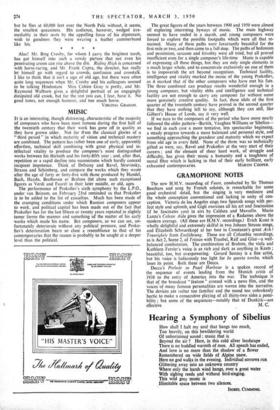MUSIC
IT is an interesting, though distressing, characteristic of the majority of composers who have been most famous during the first half of the twentieth century that their work has gone off in quality as they have grown older. Not for them the classical glories of a "third period" in which maturity of vision and technical mastery are combined. The pattern has rather been one of early, apparently effortless, technical skill combining with great physical and in- tellectual vitality to produce the composer's most distinguished works between his thirtieth and his forty-fifth year ; and, after that, repetition or a rapid decline into mannerisms which hardly conceal incipient impotence. Think of Debussy and Ravel, Stravinsky, Strauss and Schonberg, and compare the works which they wrote after the age of forty or forty-five with those produced by Handel, Bach, Haydn, Beethoven or Brahms (let alone such exceptional figures as Verdi and Faure) in their later middle, or old, ages.
The performance of Prokofiev's sixth symphony by the L.P.O., under van Beinum, on February 23rd reminded us that Prokofiev is to be added to the list of casualties. Much has been made of the cramping conditions under which Russian composers appear to work, and political capital has been made out of the fact that Prokofiev has for the last fifteen or twenty years repeated in slightly tamer forms the manner and something of the matter of his early works which made his name. But composers, as we can see, un- fortunately deteriorate without any political pressure, and Proko- fiev's deterioration bears so close a resemblance to that of his contemporaries that the reason is probably to be sought at a deeper level than the political. The great figures of the years between 1900 and 1950 were almost all exploring interesting byways of music. The main highway seemed to have ended in a marsh, and young composers were forced to explore the possible footpaths which were all that re- mained. Many of these paths were luxuriantly beautiful for the first mile or two, and then came to a full stop. The paths of hedonism and pessimism, sarcasm and frivolity were all tried, but all proved insufficient even for a single composer's life-time Music is capable of expressing all these things, but they are only single elements in a much larger whole, and to concentrate exclusively on one of them is to impoverish the art beyond recognition. Technical facility, intelligence and vitality marked the music of the young Prokofiev, as it marked that of the other composers who have met his fate. The three ' combined can produce results wonderful enough in a young composer, but vitality ebbs and intelligence and technical facility are not enough to carry any composer far without some more genuinely creative quality. In fact, these idols of the first quarter of the twentieth century have proved in the second quarter that they have nothing left to say, although they can still, like Gilbert's House of Lords, say it very well.
- If we turn to the composers of the period who have more nearly followed the older pattern—Bartok, Vaughan Williams or Sibelius— we find in each case a more tentative, less spectacular beginning, a steady progress towards a more balanced and personal style, and something approaching the grandeur and maturity which we expect from old age in every field. None of the three was so technically gifted as were, say, Ravel and Prokofiev at the very start of their careers ; and the element of sheer hard work, of struggle and difficulty, has given their music a humanity and a toughness of moral fibre which is lacking in that of their early brilliant, early


































 Previous page
Previous page